The 189th Foundation Ceremony of the University of Bern was characterised by self-reflection and future orientation. Three honorary doctorates and five academic prizes were awarded, with one recipient being streamed live into the casino for the first time.
Text: Serena Wölfel / Photography: Manu Friederich
Read the original uniAKTUELL article here.
On Saturday, the 189th Dies academicus took place at the Casino Bern, a familiar venue. An "eventful year" was drawing to a close, said Rector Christian Leumann at the beginning of his address. It had also been a "challenging year", "not only in terms of the current geopolitical situation, but also the situation of universities in our country", said Leumann. He began by recalling global world events: the ongoing war in Ukraine and, in particular, the armed conflict in the Middle East, which also poses challenges for the university.
Structural change and alliances
In the main part of his speech, Christian Leumann focussed on the future of the university - not only as a place of teaching and research, but also as part of society. In order to continue to face future challenges such as the advancing development of artificial intelligence, the university has launched the "Fit for Future" project. A process that "aims to scrutinise our structures, processes and functionality and align them with the future", continued the Rector. He cited the university's digitalisation strategy and the promotion of transdisciplinarity as the mindset of the next generation as focal points. Above all, it will be "a Change process, which we must face without bias or taboos and with an open mind".
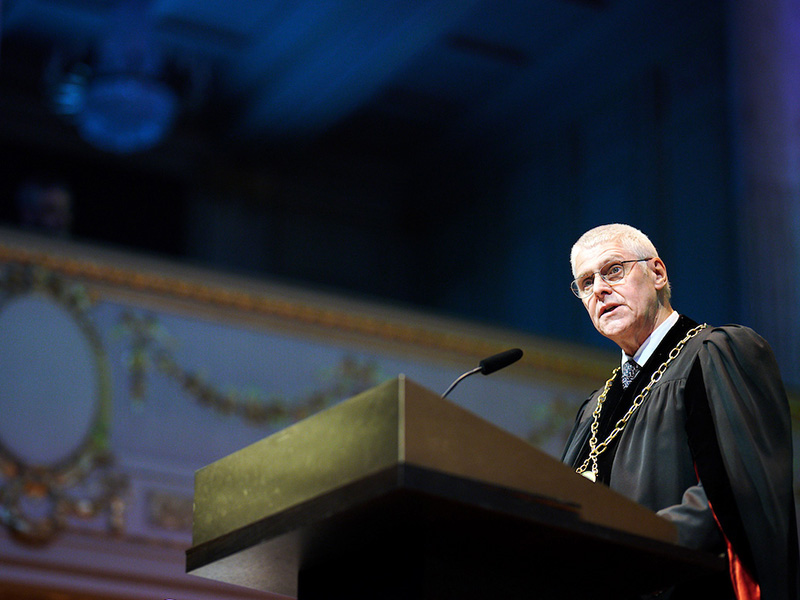
Christian Leumann, Rector of the University of Bern.
Christian Leumann concluded his welcome address with a "dream for the future of Swiss universities". After being excluded from the Horizon Europe research programme, all Swiss universities have participated in European university alliances, "but the most obvious thing, namely a comprehensive Swiss university alliance, does not exist", the Rector stated. The main obstacle is "the lack of a culture of cooperation". This must change, because "we must realise that we can no longer afford not to cooperate if we want to maintain the high international level of teaching and research". For this reason, he would like to see "a new understanding" and an "encounter at eye level" in order to strive for this common future.
Promoting equal opportunities and diversity in the future too
Government Councillor Christine Häsler also addressed "future challenges". As the Canton of Bern's Director of Education and Culture, she focussed on issues relating to work-life balance and gender equality, which remain topical for women in academia. She praised the positive developments that have already taken place in recent years as a result of measures taken by the university. As an example, the Government Councillor cited the "targeted career advancement of women". She emphasised the importance of the appointment of Virginia Richter as successor to Christian Leumann, with whom "for the first time in its almost 200-year history, a female rector will lead the University of Bern".
Christine Häsler was also confident about the university's approach to diversity and equal opportunities in a broader sense. In addition to the "newly created contact points for equal opportunities and racism", the "Better Science" initiative is an important step for the university. "In building a sustainable scientific culture", people "with their needs, abilities and actions" are at the centre of attention. The University plays a "leading role" in the promotion of equal opportunities and is well positioned "to master the future challenges in the areas of equality, diversity and inclusion", as the Government Councillor summarised. Now it is a matter of "sticking to the topic and consistently continuing along this path".
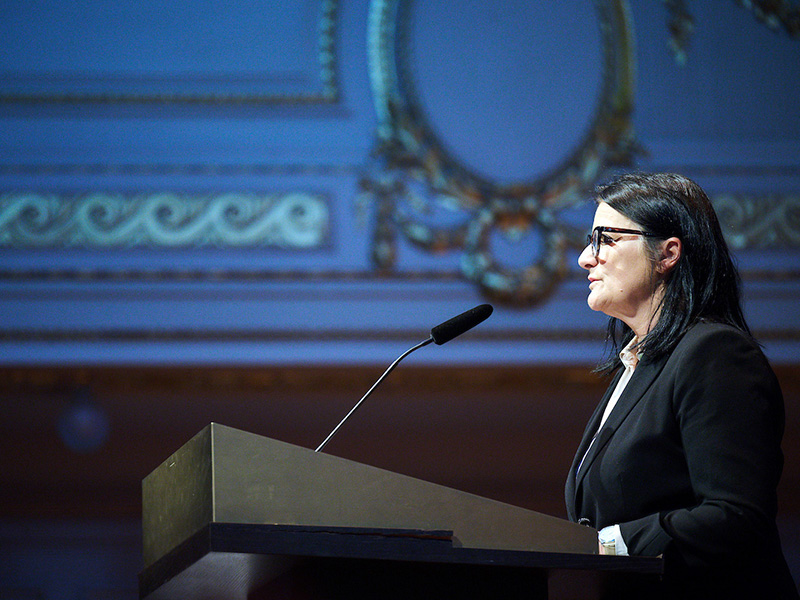
Christine Häsler, member of the cantonal government and Bern's Director of Education and Culture.
In conclusion, the Government Councillor addressed Christian Leumann. At his last Dies academicus in his role as Rector, she emphasised the good he had done for the University. As "captain", he had "navigated the university superbly for seven years through sometimes calm, but often stormy seas". The promotion of young talent and the university's international network were particularly important to him. Christine Häsler took this opportunity to thank the Rector for his "lifeblood" and his prudent and far-sighted steering of the "supertanker" University of Bern.
Enlightenment in post-factual times
As Rector Christian Leumann emphasised, it is also important to take a look "from the outside" at the university and its role in society. This year, Guy Parmelin shared his perspective. In his speech, the Federal Councillor began by emphasising the pioneering achievements of the University of Bern. For example, the Bernese solar wind sail, which was stuck in the ground of the moon before the American flag during the first moon landing on 21 July 1969. However, Parmelin joked that he did not know whether the university could now claim ownership. What is clear from this example, however, is that research takes precedence over global politics: "The most important things come first," the Federal Councillor stated.
Another event that placed the University of Bern at the forefront of world science was the appointment of Anna Tumarkin as the first associate professor of philosophy and thus the first female associate professor in Europe in 1908. Guy Parmelin concluded his review with a reference to the first faculty of veterinary medicine, which was founded at the University of Bern in 1900.
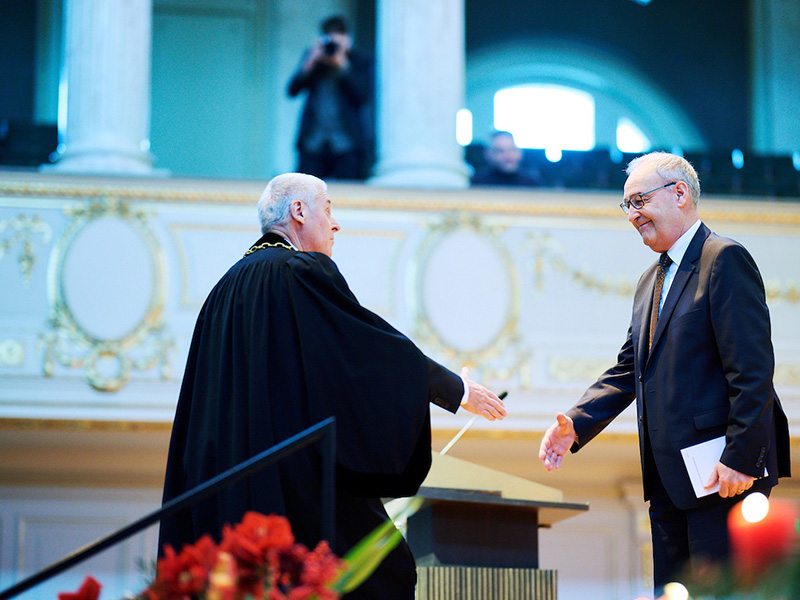
Rector Christian Leumann (left) and Federal Councillor Guy Parmelin shake hands.
Looking at the university's current position, it can be summarised that it has kept pace with the world's academic leaders. This can be seen in various areas such as space research, veterinary medicine and biomedicine, as well as in the field of sustainability and climate research. As part of the scientific "world elite", the University of Bern has an important social mission, namely that of enlightenment in these "post-factual times". In order to make forward-looking decisions, society is dependent on the science-based findings of researchers.
Excellence in research - and teaching
Finally, Mara Hofer, member of the Board of the University of Bern Student Union (SUB), had her say. She reminded those gathered of their privileged position - not only as part of the academic environment, but also as invited guests at the Dies academicus. Self-reflection is important, she said, "because the Swiss higher education landscape and therefore also the University of Bern are not perfect - even if we are already doing a lot of things right".
With this in mind, Mara Hofer reflected on the "excellence" that was honoured at the event: Excellence does not only come about through the top performance of individuals, but requires equal recognition of difference and diversity. This also means that different perspectives must be included and promoted in order to ensure the university's excellence in the future. Students should not be forgotten, as they would also be absent from the event, as Hofer noted. As a central part of the university community, students have an interest in excellent teaching and support - for everyone, not just "the top one per cent".
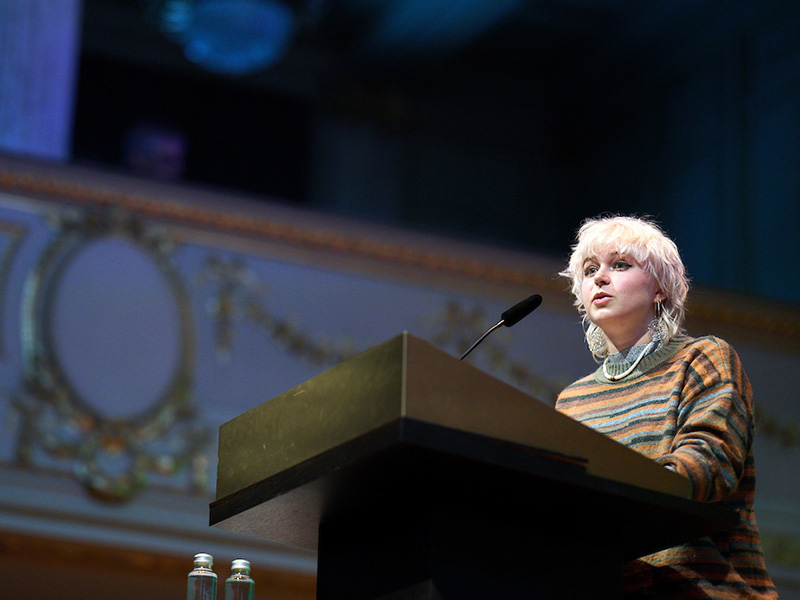
Mara Hofer, Member of the Board of the Student Union of the University of Bern (SUB).
As a representative of the students, Mara Hofer concluded by placing "the future of the next generation of students" in the hands of those present. "Ensure the growth of our funding" and "pay more attention to our teaching and support needs, even if it means a major change to existing structures."
Honorary doctorate via video stream
A musical interlude by the Bern Alumni & Symphony Orchestra was followed by the ceremonial awarding of the three honorary doctorates. Among the dignitaries was lawyer Nasrin Sotoudeh, who has been campaigning for the freedom and rights of women and girls in Iran for years. Although Sotoudeh was unable to accept the award in person due to a travel ban, she was broadcast live from Tehran to the casino via video stream. In her acceptance speech, which she gave in Farsi, she drew attention to the ongoing abuses of violence and injustice that prevail in Iran.
The University's academic prizes were then awarded. Six people were honoured personally at the foundation ceremony. Among them was Aaron Roth from the University of Pennsylvania, who received this year's Hans Sigrist Prize for his research on the design of algorithms taking into account social aspects such as privacy and fairness.
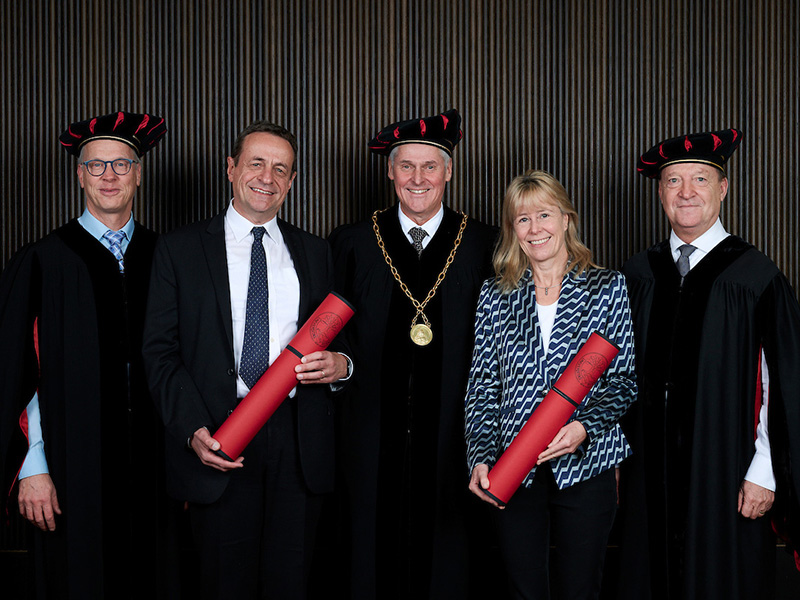
At the 189th Dies academicus of the University of Bern, three personalities received an honorary doctorate (with red diploma scroll). From left to right: Marco Herwegh, Bernd Sturmfels, Christian Leumann, Stefanie Dimmeler and Claudio Bassetti. Missing from the picture: Nasrin Sotoudeh.

At the 189th Dies academicus of the University of Bern, three personalities received an honorary doctorate (with red diploma scroll). From left to right: Marco Herwegh, Bernd Sturmfels, Christian Leumann, Stefanie Dimmeler and Claudio Bassetti. Missing from the picture: Nasrin Sotoudeh.
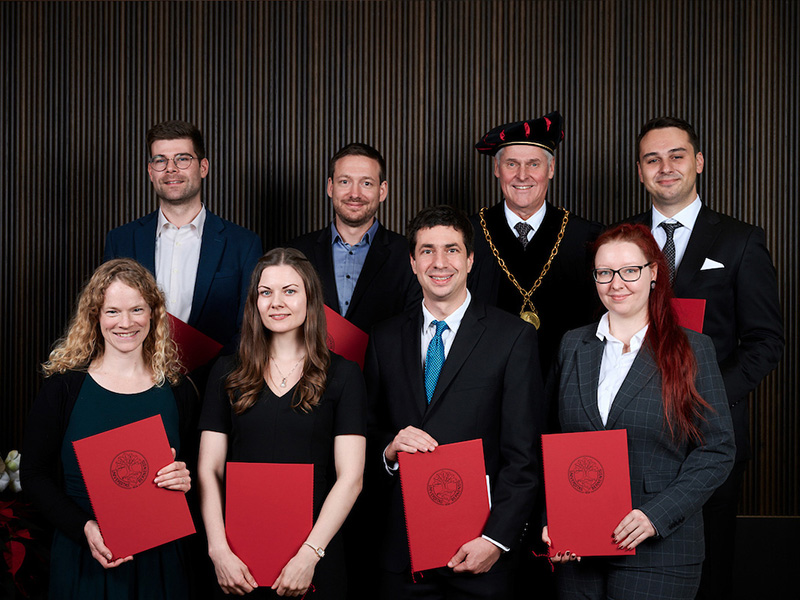
Eight people received an academic prize (with red certificate) at the Dies academicus 2023. Back from left to right: Andrin Büchler, Sebastian Shaw, Christian Leumann, Nicolas Christian Albert Lentz. Front from left to right: Alma Brodersen, Therese Solberg, Aaron Roth, Fabienne Wöhner. Missing from the picture: Coralie Dessauges.
THE DIES ACADEMICUS
The Dies academicus commemorates the founding of the University of Bern in 1834 and takes place annually on the first Saturday in December. On the Dies academicus website you will find further impressions of the event, information on all honorary doctorates and award winners.